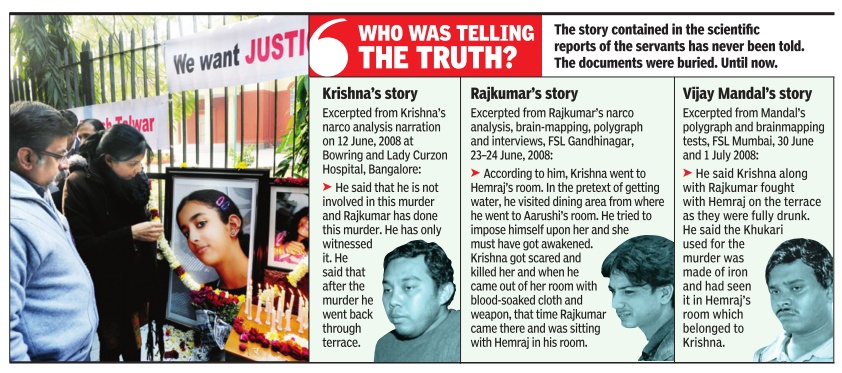Aarushi Talwar murder, Noida, 2008

This is a collection of articles archived for the excellence of their content. |
The case: In brief
The Times of India Jul 05 2015
Aarushi judge wrote `verdict' even before defence finished argument
The twists and turns of this 2008 Noida double-murder case had the nation riveted for years. Exclusive excerpts from `Aarushi', an investigative book by journalist Avirook Sen who covered the trial
The apparently simple finding that the motive of the crime had been established perhaps hid behind it the grossest perversion. To establish that Rajesh Talwar had killed Aarushi and Hemraj because he saw them having sex in her room, one had to first prove that Hemraj was there. The source of this `motive' was M.S. Dahiya's report with its flawed assumption that Hemraj's blood was found on Aarushi's pillow. Dahiya and Kaul (the forensic scientist and the investigating officer), had stubbornly insisted that in a forwarding letter written by an officer called Dhankar, three days after its recovery on 1 June 2008, the pillow cover was described as being found in Aarushi's room.
Tanveer Ahmed Mir had allowed Dahiya to stand by his report and not challenged it on its premise. The source of the pillow cover bearing Hemraj's blood was proved in court over a year ago: the exhibit was displayed and its original tag, signed by CBI officers, read out. It was found on Hemraj's bed, in the servant's room.Not in Aarushi's bedroom.
This was perhaps the most critical piece of evidence in the prosecution's case, the missing keystone. If Hemraj's pillow cover had indeed been found in Aarushi's room, the case against the Talwars was solid.But it wasn't.
Judge Shyam Lal had watched these dramatic events unfold in his courtroom keenly the previous summer. In his judgement, while evaluating the forensic report on the pillow cover, Judge Shyam Lal added this line: `. . . it becomes abundantly clear that Hemraj's DNA has been found on the pillow cover which was recovered from the room of Aarushi as per letter dated 04.06.2008 of SP CBI.
`The difficulty was finding a typist.Because, you know, in Ghaziabad all typists are for Hindi only. Only one or two stenos are there who can type the judgements in English. We had to make special arrangements. In fact I was the one who typed the beginning personally . First ten pages.' The judgement was 210 pages, and although much of it was cut and pasted off other judgements, I was interested in how long it took to write.Ashutosh Yadav, who was extremely happy to have made his own contributions to the document, unwittingly let a secret out: `It took more than one month,' he said.
`So you had gone to Ghaziabad more than a month before to help out...?' `Yes, I was there,' said Ashutosh.
I took this information in, and did my best to appear deadpan. Because the facts were these: Judge Shyam Lal pronounced his judgement on 25 November 2013. Tanveer Ahmed Mir, counsel for the defence, began his final arguments on 24 October.Over the next two weeks he would argue on a total of 24 circumstances that he felt should lead to acquittal.Seven of these were major points. As Judge Shyam Lal and his son sat down to write the judgement, Mir had not even begun.
The Talwars and Mir had their own stenographer related problems and would submit the arguments in writing only around 10 November.(Their typist was also a kabab seller who had got busy with his food business in the festive season.) At each hearing Judge Shyam Lal earing Judge Shyam Lal would urge Mir to do two things: wrap up quickly and submit the written argu ments. As Mir soldi ered on, neither he nor the Talwars would have known the fruit lessness of their exer cise. Ashutosh was right, the guilty ver dict was already being worked on. Shyam Lal after a brief while mumbled: `No, no . . . about a fortnight, not a month.' But by then, his son had given too many details away: his trip to Ghaziabad, that he typed out the first ten pages himself as they tried to make special arrangements for a typist, the requirement for `good words' which took time.